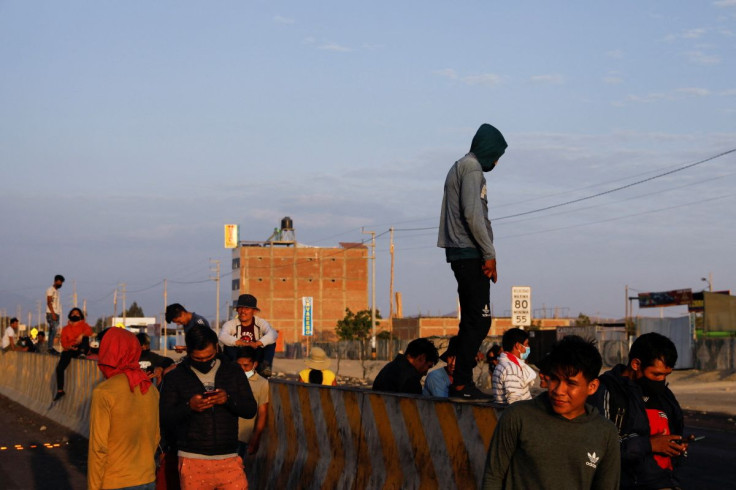Ukraine War Ignites Protests In Peru As Inflation Anger Goes Global

Marcelo Gonzales is tired and angry about rapidly increasing living costs in his dusty village on Peru's desert coast, where food and fuel inflation inflamed by the war in Ukraine has ignited protests that threaten to destabilize the government.
The social upheaval in the Andean country underscores how the impact of Russia's Feb. 24 invasion of Ukraine is rippling around the world, with leaders in Sri Lanka and Pakistan also under public pressure over difficult economic conditions.
Inflation in Peru has reached its highest level in a quarter of a century, hammering people already hit hard by the coronavirus pandemic since early 2020.
"The cost of a family's basic daily needs has brutally gone up," Gonzales told Reuters, surrounded by hundreds of angry residents in the western village of Villacuri and where people from all parts of Peru come to work at the large fruit plantations nearby.
Last week Gonzales led people from his village, which is about 240km (150 miles) south of the capital Lima in the Ica region, to block the country's most important highway, demanding the government act to lower prices, especially for essentials such as vegetable oil, chicken, rice and cooking gas.
"We can't afford rent or to buy things for our kids," said Maribel Condori, a mother of three in Villacuri.
Peruvians in poor rural towns around the country have taken to the streets, sometimes violently, to demand lower prices, putting socialist President Pedro Castillo's already-wobbly administration on edge. The former teacher survived a second impeachment attempt on March 28 following allegations of graft, which he denies.
At least six people have died in clashes with police, including one in Ica, authorities have said. Officials have so far been unable to reopen many of the blocked roads, although the Pan-American Highway, which traverses the length of Peru along the Pacific Ocean, is currently open following a 48-hour truce that ends on Saturday.
Peru has also deployed its military in a bid to regain control of its highways.
Earlier this week Castillo imposed a curfew in Lima to try to stifle the protests, but that backfired as thousands took to the streets in defiance. Some looted shops and government buildings.
"We are not against the President," said Gonzales. "We are against Congress, which is very concerned about impeachments but never works for the people."
"We want to change the constitution, specifically to change the part that says the government cannot control the prices set by private companies," said Gonzales, who plans to continue the blockade after the truce unless the government commits to lowering prices.
Peru, while economically stable, has been beset by political crises and protests this year, leading to Castillo's support dwindling and raising doubts over whether he will see out his full mandate until 2026.
EMERGENCY MEASURES
Inflation in Peru over the past year is just under 7%, but prices of essential items have risen faster. The increases have accelerated since the war began. Ukraine and Russia account for 29% of the world's wheat exports and 19% of maize shipments.
Food, housing, energy and fuel inflation has surged over 11% in the past year, according to Peru's national statistics agency. Food oil and sugar have spiked even faster, rising 50% and 35% respectively.
"The price increase for essential items is real," said Prime Minister Anibal Torres on Wednesday. "But what is sometimes not said ... is that this is an international problem, it is due to the war that is happening between Russia and Ukraine."
The government has taken some emergency measures to ease costs, including waiving most taxes on gasoline and giving vouchers to poor residents to buy cooking gas. It has also raised the minimum wage by about 10%.
But so far it's had little effect cooling public anger.
Residents of Villacuri said they earned slightly over the minimum wage, around 1,400 soles (about $375) a month, helping agricultural companies during the harvest seasons.
"It's not enough, honestly," said Condori, the mother of three. "If you add up what we need to buy: chicken, rice, sugar ... it's not fair. It's time for the government to defend the people. We want a new constitution."
Chants asking for a new constitution are heard everywhere in Villacuri, where a section of the Pan American Highway is covered in powdered glass and rocks, a sign of recent clashes. Nearby, toll booths were burned.
Peru's constitution, a market-friendly text seen as helping business growth, was drafted by former President Alberto Fujimori in the 1990s after he violently shut down Congress and the judiciary. Many support it as a foundation of relative economic stability, but opposition is rising.
"We've always wanted a constituent assembly," said Cediano Lima, another Villacuri resident. "Now we want it even more because prices have gone up, so we are asking the President to call one once and for all."
($1 = 3.6921 soles)
© Copyright Thomson Reuters 2024. All rights reserved.





















